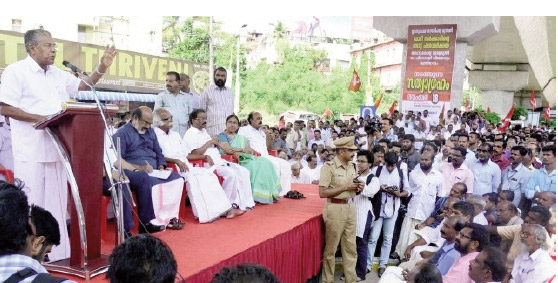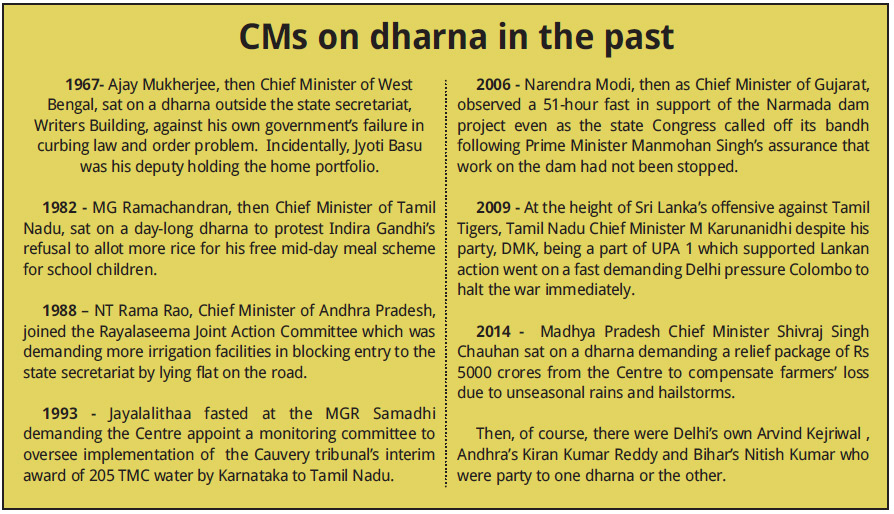Challenges to Centre's diktat
Santosh Kumar
The ruling Left Front
government in Kerala,
unlike other state
governments, has shown
much alacrity in raising the
banner of revolt against
the Central government's decision to
demonetise the old Rs1000 and Rs 500 notes.
 Kerala Chief Minister Pinarayi Vijayan delivering the inaugural speech
at a dharna against the alleged attempts by the Central Government
to destroy the cooperative sector
What prompted Chief Minister
Pinarayi Vijayan and his entire Cabinet
to sit on a day-long dharna in front of Thiruvananthapuram was the
crippling of the State's cooperative
movement due to what they termed
the "myopic and egotistic" decision of
Prime Minister Narendra Modi.
Cooperative societies are the lifeline
of not only the ordinary people of
Kerala but also of political parties.
That is why the move has got much
public support in the state.
Cooperative banks are virtually the
backbone of Kerala's economy.
Statistics on the credit cooperative
societies speak for themselves: 1604
banks with over 2500 branches. The banks have a total membership of
over 20 lakhs and are worth Rs 1,382
crores. Except for Rs 122 crores
deposited by the government, the rest
of the money belongs to the public.
These banks have a total deposit of Rs
90,000 crores of which about Rs
75,000 crores is dispersed as loans.
While the cooperative sector's
lending-deposit ratio is about 80 per
cent, the major public sector bank in
Kerala, the State Bank, has a lendingdeposit
ratio of only 52.6 per cent.
Kerala Chief Minister Pinarayi Vijayan delivering the inaugural speech
at a dharna against the alleged attempts by the Central Government
to destroy the cooperative sector
What prompted Chief Minister
Pinarayi Vijayan and his entire Cabinet
to sit on a day-long dharna in front of Thiruvananthapuram was the
crippling of the State's cooperative
movement due to what they termed
the "myopic and egotistic" decision of
Prime Minister Narendra Modi.
Cooperative societies are the lifeline
of not only the ordinary people of
Kerala but also of political parties.
That is why the move has got much
public support in the state.
Cooperative banks are virtually the
backbone of Kerala's economy.
Statistics on the credit cooperative
societies speak for themselves: 1604
banks with over 2500 branches. The banks have a total membership of
over 20 lakhs and are worth Rs 1,382
crores. Except for Rs 122 crores
deposited by the government, the rest
of the money belongs to the public.
These banks have a total deposit of Rs
90,000 crores of which about Rs
75,000 crores is dispersed as loans.
While the cooperative sector's
lending-deposit ratio is about 80 per
cent, the major public sector bank in
Kerala, the State Bank, has a lendingdeposit
ratio of only 52.6 per cent.
Most of this money is deposited in
district cooperative banks and various that only a maximum of Rs 24,000 can
be withdrawn per week is a body blow
to these banks. In a way cooperative
banks have been equated with
individuals. There lies the crux of the
problem. Moreover, the RBI through a
directive on November 14 has barred
cooperative banks from accepting the
Rs 1000 and Rs 500 notes as deposits
or exchanging them into the new
currency. The people in the state
depend more on these cooperative
banks which have a wider network
than any commercial bank. Hence any
move to shackle the working of these state's economy which might lead to
large-scale protests from the people.
So it was not surprising that the CPMled
LF government got the backing of
all political parties in its decision to
oppose this "draconian" move of the
Central government.
Though there are some discordant
voices within the opposition
Congress-led United Democratic Front
which was voted out of power in the
May Assembly elections, by and large
there is a common understanding
that the move will only stifle the state
economy. Ironically, a 2013 study by
the RBI itself had highlighted the
stellar role played by the cooperative
sector in rural areas. The study further
pointed out that most of the rural
poor are dependent on these societies
for their immediate financial needs
and almost 60 per cent of the rural
population holds membership in
these societies. Other than Kerala,
farmers in states like Mharashtra,
Uttar Pradesh, Gujarat and Karnataka
mostly rely on cooperative banks for
farm loans.
The Reserve Bank and the Income
Tax department contend that there is
large scale black money stashed in
these cooperative banks, The Central
government agrees. The state BJP,
though it controls a sizeable number
of credit societies in north Kerala, has
been raising this issue for quite some
time and is now insisting that it is
those with black money who are
behind this agitation. The party
demands that these banks be brought
under the norms of RBI, which means
that these banks cannot lend farmers
loans without interest. Nor they will
be able to run medical shops and
other business establishments and
also promote housing projects for the
homeless.
It is a known fact that most of these
banks accept deposits without strictly following the KYC (know your
customer) norms. Many of these
banks have been and are under the
scanner for money laundering. In a
state like Kerala political parties vie
with each other in taking control of
these societies. Elections to the
cooperative banks are as intense as a
general election. There is a general
belief among the public that political
parties misuse these banks to hide
their ill-gotten wealth. Most of these
are deposited in fake accounts of nonexistent
individuals.
No political party is above
suspicion. Moreover, the CPM had
been singled out in the past for using
or misusing the cooperative
movement to widen its support base.
Critics of the CPM rightly point to the
party-owned Rs 30-crore water theme
and amusement park at the famous
temple town of Parassinikadavu in
Kannur district, a known Marxist
stronghold.
The park was set up despite strong
protests from environmental groups.
Kannur district also occupies a prime
place in the state having maximum
number of cooperative societies and
the project is managed by CPM controlled Malabar Tourism
Development Cooperative Society
Limited. The same is the case with
Pariyaram Medical College, again in
Kannur.
Ever since CPM took complete
control of this first self-financing
medical college under the cooperative
sector in the country in 2007, it was
plagued with corruption charges and
was accused of accepting huge
amounts as capitation fees. Though
CPM has brushed aside all allegations
regarding diverting money from its
cooperative banks for business
purposes, a big question mark hangs
over these and a couple of other
establishments controlled by the
party.
But these faults cannot be cited as
reasons to tarnish the role of the
cooperative movement as a whole in
rural Kerala. Nor is it a reason to put a
blanket ban on the activities of
cooperative societies. If the Centre, as
alleged by all political parties, except
the BJP in the state, is trying to clamp
down on these societies in the name
of flushing out black money it is
definitely unwarranted. For people
believe that this is just another bid by their corporate friends who had
financed his election campaign in
2014.
Even the Supreme Court has
criticised the Centre's move to block
those who approach high courts for
relief against this 'draconian' measure
and has even warned of riots in the
country. At the same time, it is
worthwhile for political parties to
cleanse the system of any
wrongdoing. The cooperative
movement has played a definite and
positive role for the betterment of
rural poor dating back to preindependence
days.
The support given by the people of
Kerala for the anti-Centre movement
launched by the LDF government is a
reflection of the sentiments of those
millions who have been queuing up in
front of banks and ATMs across the
country for days.
It is time Narendra Modi and his
ministers realise that every
movement against their government
cannot be branded as anti-national.
Nationalism, after all, is not the
birthright of the BJP and the Sangh
Parivar alone.





 Kerala Chief Minister Pinarayi Vijayan delivering the inaugural speech
at a dharna against the alleged attempts by the Central Government
to destroy the cooperative sector
Kerala Chief Minister Pinarayi Vijayan delivering the inaugural speech
at a dharna against the alleged attempts by the Central Government
to destroy the cooperative sector